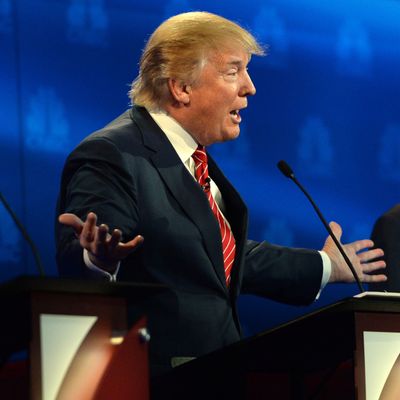
In his speech from the Oval Office on Sunday night, President Obama took care to urge his fellow citizens not to equate the extremism of ISIS with the beliefs of Muslims as a whole. “Just as it is the responsibility of Muslims around the world to root out misguided ideas that lead to radicalization, it is the responsibility of all Americans, of every faith, to reject discrimination. It is our responsibility to reject religious tests on who we admit into this country. It’s our responsibility to reject proposals that Muslim-Americans should somehow be treated differently.” Obama made his case on both pragmatic grounds (mistreating Muslims would feed into ISIS’s preferred narrative) and on moral grounds (Muslim-Americans deserve the same rights as the rest of us). Obama’s comments drew particular ire from Senator Marco Rubio, a leading Republican presidential candidate. “And then the cynicism, the cynicism tonight to spend a significant amount of time talking about discrimination against Muslims,” Rubio declared on Fox News. “Where is there widespread evidence that we have a problem in America with discrimination against Muslims?”
It is unclear what sort of evidence Rubio would accept. According to FBI statistics, hate crimes against Muslim-Americans, which spiked in 2001 after the 9/11 attacks, have settled in at an elevated level five times higher than before 2001. If Rubio considers these dry statistics too abstract, he could look to current Republican poll leader Donald Trump, who last night proposed a “total and complete shutdown of Muslims entering the United States.”
Trump has dominated the Republican race by channeling the passions of its base more authentically than any other candidate. Trump’s imprint has been felt in ways that go far beyond his mere chances of capturing the nomination, which (I continue to estimate) remain low. Liberals fall into the habit of assuming that the most authentic spokesperson for the party’s base must necessarily be its most likely leader. The vociferous opposition Trump provokes among Republican leaders guarantees the last non-Trump candidate left standing will enjoy their consolidated and enthusiastic support. What Trump has done is to make the Republican party more Trump-like.
After 9/11, George W. Bush mostly succeeded in channeling nationalistic feelings away from anti-Muslim bigotry. Bush’s departure opened a sewer of ugly sentiments. One early episode of right-wing hysteria focused on a planned Muslim cultural center in lower Manhattan, which conservatives denounced as a “Ground Zero Mosque.” Republicans argued at the time that freedom of religion, which would normally safeguard a minority group’s right to build a cultural center with a house of worship, was overridden by anti-Muslim anger. (Marco Rubio: “We are a nation founded on strong principles of religious freedom. However, we cannot be blind to the pain 9/11 caused our nation and the families of the victims.”) In the intervening years, Ben Carson has suggested a Muslim should not be allowed to serve as president, and large numbers of his fellow partisans agree. A poll this fall found that only 49 percent of Iowa Republicans believe Islam should be legal. Ted Cruz and Jeb Bush have both proposed to allow only Christian refugees into the U.S.— a proposal that has absorbed zero percent of the backlash generated by Trump’s comments despite being three-quarters as noxious.
Republicans distrust Trump for many reasons, beginning with his short and unconvincing record of loyalty to the party’s well-being. As threatening as they have found Trump’s candidacy, it has the convenient side effect of allowing them to define a general tendency in their party as a personal quirk associated with a buffoonish individual. The antipode of the Democratic belief that Trump is certain to rule the GOP is the Republican conviction that the cancer he represents can be cleanly severed from the body.
Take, for instance, David Brooks’s insistence a month ago that Marco Rubio needs to denounce Trump more forcefully if he is to prevail. “I’m sorry, Marco Rubio, when your party faces a choice this stark, with consequences this monumental, you’re probably not going to be able to get away with being a little on both sides.” This high-minded sentiment is actually closer to the opposite of reality. The way to consolidate leadership of a political party is not to polarize it but to straddle its divide. Trump’s most plausible opponents have doled out their rebuttals in carefully calibrated doses. “Well, that’s not my policy,” says Cruz.
Rubio goes a bit further: “I disagree with Donald Trump’s latest proposal. His habit of making offensive and outlandish statements will not bring Americans together.” But note the contrast between Rubio’s condemnation of Trump’s anti-Muslim bigotry and his earlier condemnation of Obama’s rejection of anti-Muslim bigotry. Rubio impugns Obama’s motives for rejecting discrimination against Muslims. (“Cynicism”!) He makes no such judgment about Trump’s motives. Rubio needs to harness the same passions that Trump is exploiting, but to do so more carefully. His anti-anti-bigotry message cleverly redirects conservative resentment away from Muslims and toward the liberals who cynically denounce anti-Muslim prejudice and refuse to present the case against ISIS as a war of civilizations.
Parliamentary systems channel far-right nationalistic movements of the sort Trump is leading into splinter parties. The American winner-take-all system creates two blocs that absorb far-right movements into the mainstream. Rubio, like all the Republican contenders, has promised to endorse Trump if he wins the nomination, a constraint that limits their ability to denounce him. You can’t call a man a fascist while promising to support him if he collects the requisite delegates. Unless Republican elites are willing to actually cleave the GOP in two — and they have displayed no such inclination — they are going to live with the reality that they are part of an entity that is substantially, if not entirely, a party of Trump.






























